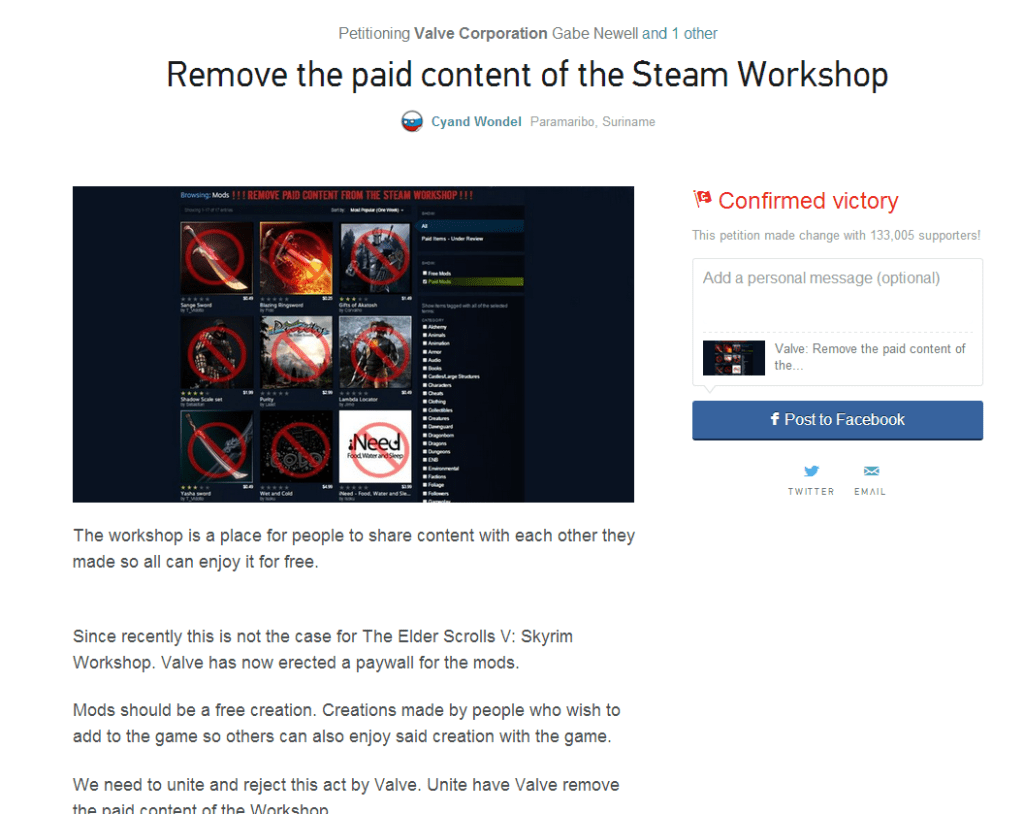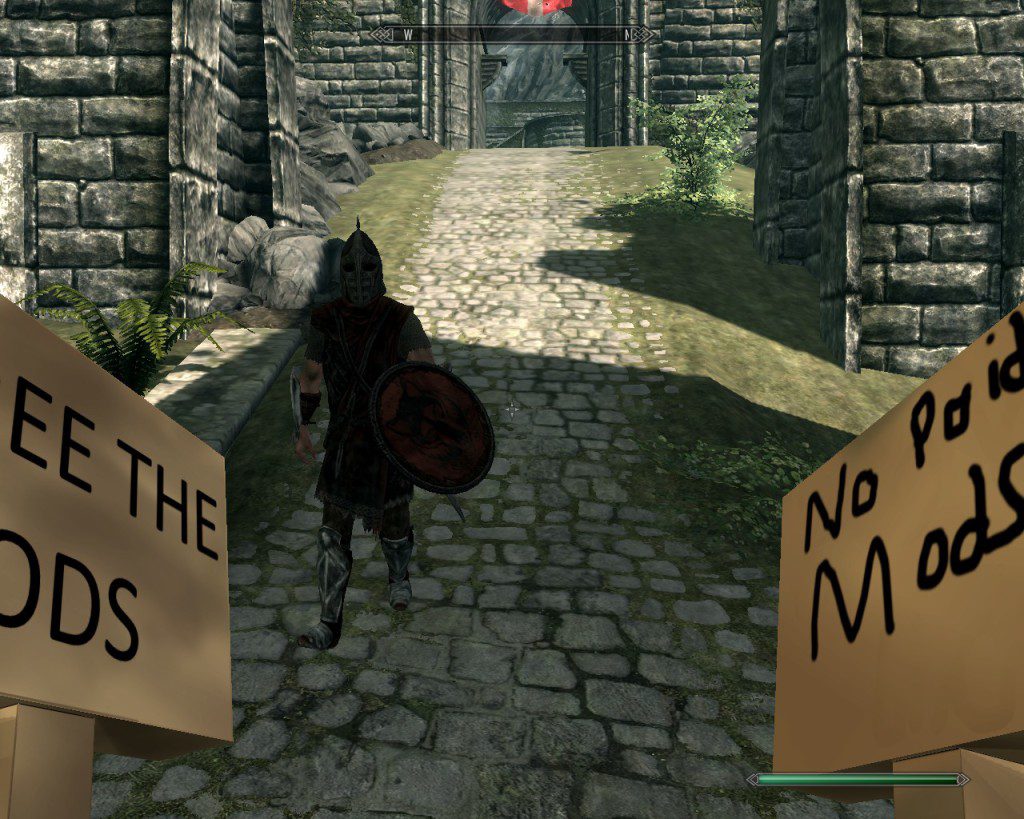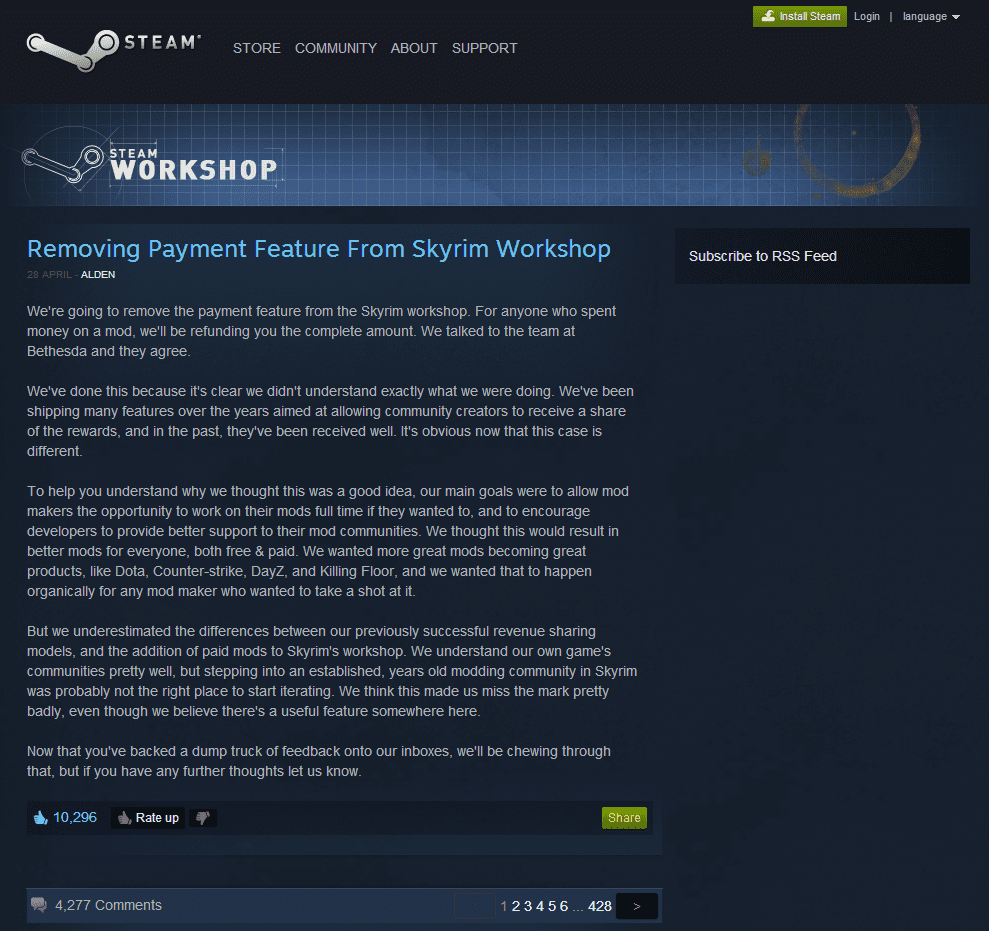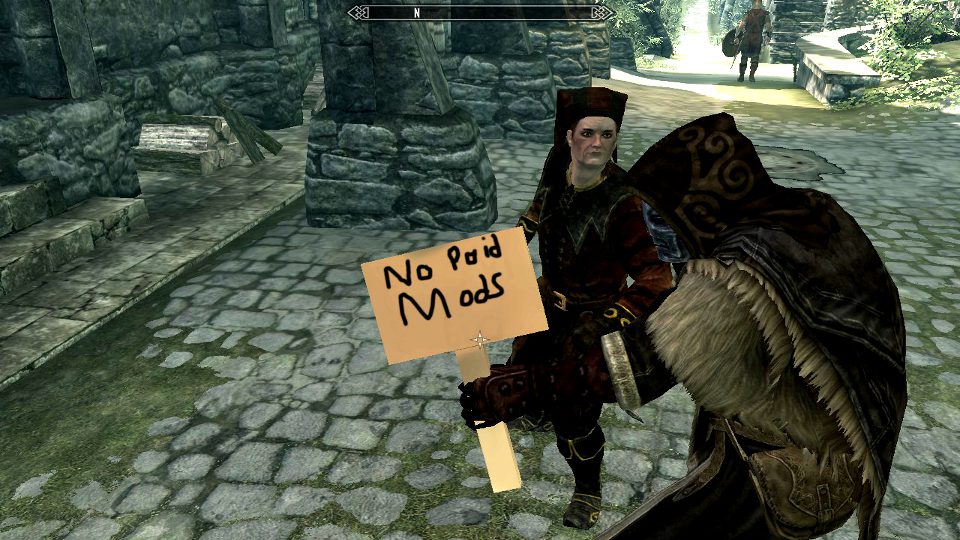Valve is no stranger to controversy. Any major change or addition to its service is usually met with apprehension, concern and even pessimism by a percentage of the gaming community. Some, such as Early Access and Green light, are still hotly debated as to whether or not they have made the service better or worse, and this debate and dialogue with Valve is likely to continue for as long as the platform exists.
Throughout most of these ventures however, Steam users have generally been willing to see how the additions pan out, and despite significant doubt over certain changes, there has always been the feeling that Valve would be right in the long run, and that, essentially, they know what they are doing. Paid mods, however, were a completely different story. Marred by controversy and huge resistance from the get go, the addition of being able to buy mods on the Steam Workshop caused such massive debate within the community, that it was reversed only a week or so after being implemented.
On the 23rd April, a change to the Steam Workshop meant that 19 mods for The Elder Scrolls V: Skyrim turned into ‘paid mods’, costing anywhere between 50p and £5. Creators were able to choose if their mods costed money, and they could set their own price. Unlike the way in which User created content is curated and sold by Valve on Team Fortress 2 and Dota 2, this would be a completely open market, with the protection of a 24 hour refund policy that would be credited directly to a buyers wallet should they claim a refund.
The intention was clear, allowing modders to earn money making their creations should incentivise high quality modding, and let the usually one person teams spend more time working on the projects they love, and fledgling artists and coders just starting out on their careers could now start earning for the hours they were putting into the game. Buyers could support mod authors, authors could choose whether or not they charged for a mod, and the refund policy meant it was virtually risk free. Along with changes to the workshop that meant any filesize could now be uploaded, as well as streamlining the subscription process, to Valve and Bethesda, it sounded like a win win all round.
Many in the community did not see it this way. Soon after the changes were implemented, a petition was started in order to ‘reject this act by Valve’, on the basis that Mods have always been, and should always be a free creation, community babies made for love not profit. They were also concerned that it could create a ‘hole in the PC gaming community’, leading to a flood of poorly made mods made by people looking to make a quick buck. Within a few days the petition had reached 50 thousand signatures, within a week over a hundred thousand. It was clear from the start that this opposition was deadly serious, and the outrage many felt was clear and palpable.

Protests came in thick and fast, and in more ways than a petition. For a while, the most popular mod on Skyrim was a simple sign that on one side read ‘FREE THE MODS’ whilst on the reverse ‘NO PAID MODS’. It received over ten thousand ratings on the store, averaging out to a solid 5 star score. Whilst there were many other mods made as a protest, they all served the same purpose. They were sending a message to Valve that they would put up a fight, and they would not give in. The protest was not unanimous however. Many felt that a better system would be one of donation, so many modders attempted to create both free and paid versions of their mods so users would receive a choice, whilst many users asked for a ‘pay what you want’ system. By this point it was clear there were three camps emerging, one that was defending the system, one that wanted to change it, and one that wanted it gone.
There were a number of initial issues that people had with the system. Mods appearing for money were not always of particularly high quality, with it turning out that the time window Valve gave the initial developers being very small. Many mods included symbols or characters from big franchises or were a mix of a number of free mods, potentially causing legal issues in the long run. There has also been the implication that Valve censored many peoples concerns and disabled comments. Modders that started to promote the system faced a backlash from unhappy users, potentially tearing the community apart.
Early controversies only served to complicate the debate. Modder Chesko included an animation system in his own mod that was made by another creator, and was readily available for free on the store. He explained that his mod did not require the other one, but was made better with it, and that Valve allegedly said it would be fine to do so, with him eventually trying to remove his mod from the store, citing that the controversy had left him ‘beyond worn-down’, and potentially leaving the mod scene. This type of story was oft repeated, that many of the paid mods appearing on the store seemed to have components stolen from free mods or mods on the Nexus, by creators that had no right to sell said components. Forums across the internet exploded with rage, and comments across the Steam service flew in rapidly.

In addition, many accused Valve and Bethesda of being greedy, taking far too much of the share of revenue from a sale, leaving only the creator with 25%, leaving many feeling Valve was doing this purely for monetary and business reasons. Despite all this, Valve remained optimistic. Gabe Newell, company boss, took to Reddit to defend the new programme in an AMA. Gabe countered worries that Modders were essentially unaccountable and that mods would now have to come under increased scrutiny for copyright breaches which could stifle development, by claiming that paid mods will increase investment in quality modding, not hurt it. He went on to discuss how many of Valve’s big names came directly from the modding world, such as John Cook and Robin Walker of Team Fortress fame, and that earning money for making mods would allow many small developers a road into game development.
Gabe also declined that he was doing it for monetary reasons, stating that paid mods had only generated $10K total, and that Valve was not ‘evil’ as they would continue to listen to users and adjust the system as necessary in order to ‘make modding better for the authors and the gamers’. Despite many trusting in his sincerity, they were still not convinced by the system, with protests and articles across the internet continuing to damn the system. In contrast, support for paid mods was beginning to find its voice. Race The Sun creator Aaron San Filippo publicly defended the changes, claiming that it would provide a path to professional game development, better mod support as smaller companies could afford to push mods for longer, provide new business models as well as potentially revitalize communities.
Other large names threw their hats in the ring, Garry Newman of Garry’s Mod fame, the man that turned a mod into a paid game, stated that his history made it clear paid mods could be a good thing, that without selling his mod he would never have been able to turn it into the product it is today or form his company, and that early concerns about the marketplace should be tempered as they will eventually ‘balance out’ as long as people vote with their wallets and Valve provides ample protection for buyers. He rebuffed concerns about stolen mods being sold, likening it to video game piracy at large, and that we shouldn’t let ‘assholes’ dictate what happens. He also claimed that free mods would still exist, and nobody would have to buy anything they didn’t want to. Detractors claimed that selling a mod was different to selling a game, as publishers had to adjust price in order to keep their company afloat, whereas it didn’t matter to a modder if they only sold a few copies so there was no reason for them not to charge. Shawn ‘FMPONE’ Snelling, creator of popular CS:GO maps, added that as a modder he ‘deserved compensation’, and that whilst there were issues with the implementation of paid mods, in the long term it could be a great system if the community gave it a chance, which he stated they had not done yet.
Bethesda was forced to defend itself too, noting that it believed that the best creators deserved compensation, and that this service would in the long run only promote mod development and the community instead of detract from it. However, it was not enough. The vast majority of users – and clearly the most vocal – still did not support paid mods in any form, and would not settle until it had been completely removed. Valve seemingly began to understand that it was fighting a losing battle, and risking much of the trust it had gained with its community over the years, and its reputation as a company that cares for the gamer.
Alas, on the 28th April in a blog post on Steam, Alden Kroll announced the removal of the payment feature. In this post, Kroll mentioned that it became clear that Valve didn’t understand exactly what they were doing, underestimating the differences between previous business models and the addition of paid mods, and that using an established modding community such as Skyrim was probably not the best place to start. He reiterated that the company had done it for only good intentions, and that they still believed there was useful feature in there somewhere, despite missing the mark this time. Bethesda released a similiar post, simply stating that they understood fans did not want this change. Users were delighted, claiming they had ‘won the fight’ and that ‘people power’ could win battles if they pushed hard enough. Everyone who purchased a mod was reimbursed, and for now the workshop is back to the way it was before.

This story is not over, the debate has continued over whether or not paid mods were a good thing, and the influence the purported donate button may have if it becomes reality in the future. People will continue to discuss this for a long time. My own opinion on the matter is somewhat on the fence, I understand the potential for abandonware and exploitation, though I also understand that market forces could have corrected many of these issues. I suppose it would have been better to see how this affected a relatively small unknown game with very few mods around as a trial run, I think the greatest mistake they made was choosing Skyrim as a testing ground. More than anything, it has reminded Valve that they are a company that needs the support of its community to function, and they are a very vocal one.
So what do you think? Do you have any stories or opinions about the whole debate? Let us know in the comments below.
Sources
http://www.pcgamer.com/valve-allows-mod-makers-to-sell-their-creations-on-steam/
http://steamcommunity.com/games/Skyrim/announcements/detail/139952470913885583
http://steamcommunity.com/workshop/aboutpaidcontent/
https://www.change.org/p/valve-remove-the-paid-content-of-the-steam-workshop
http://steamed.kotaku.com/steams-most-popular-skyrim-mod-is-a-protest-against-pai-1700486550
http://steamed.kotaku.com/skyrim-modder-considers-quitting-after-steam-controvers-1700077114
http://www.eurogamer.net/articles/2015-04-27-gabe-newell-responds-to-paid-for-mod-controversy
http://www.polygon.com/2015/4/27/8496523/steam-paid-mods-skyrim-opinion-argument
http://garry.tv/2015/04/24/paying-for-mods/
http://www.pcgamer.com/im-a-modder-i-deserve-compensation/
http://www.bethblog.com/2015/04/27/why-were-trying-paid-skyrim-mods-on-steam/
http://steamcommunity.com/games/SteamWorkshop/announcements/detail/208632365253244218
http://www.gamersnexus.net/gg/1926-steam-paid-mods-postmortem-analysis





